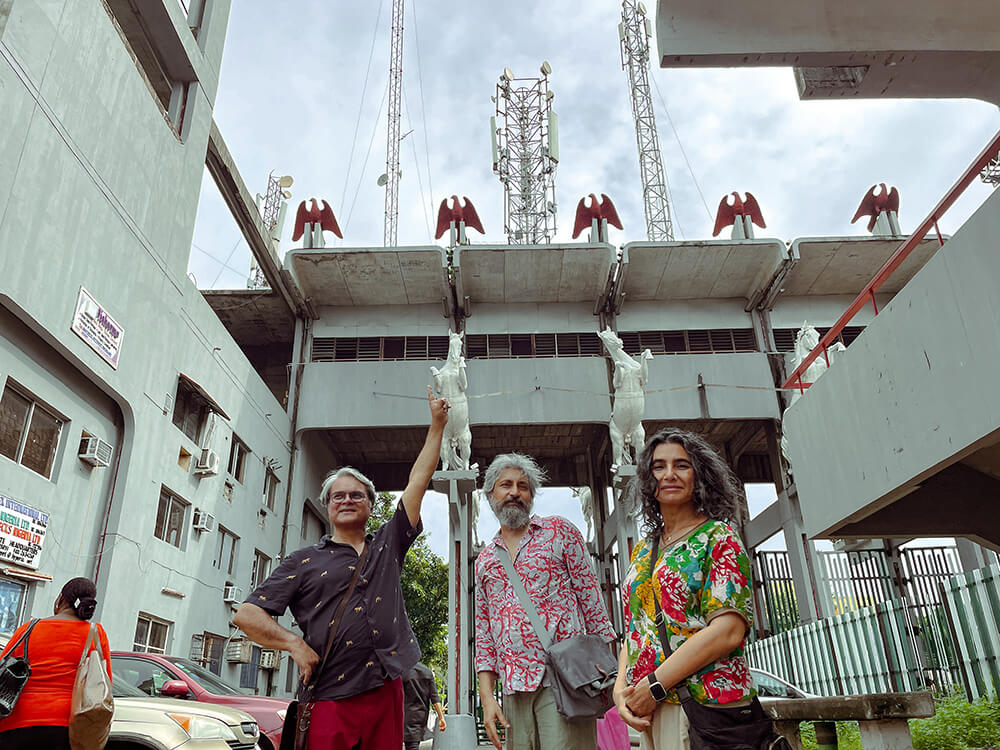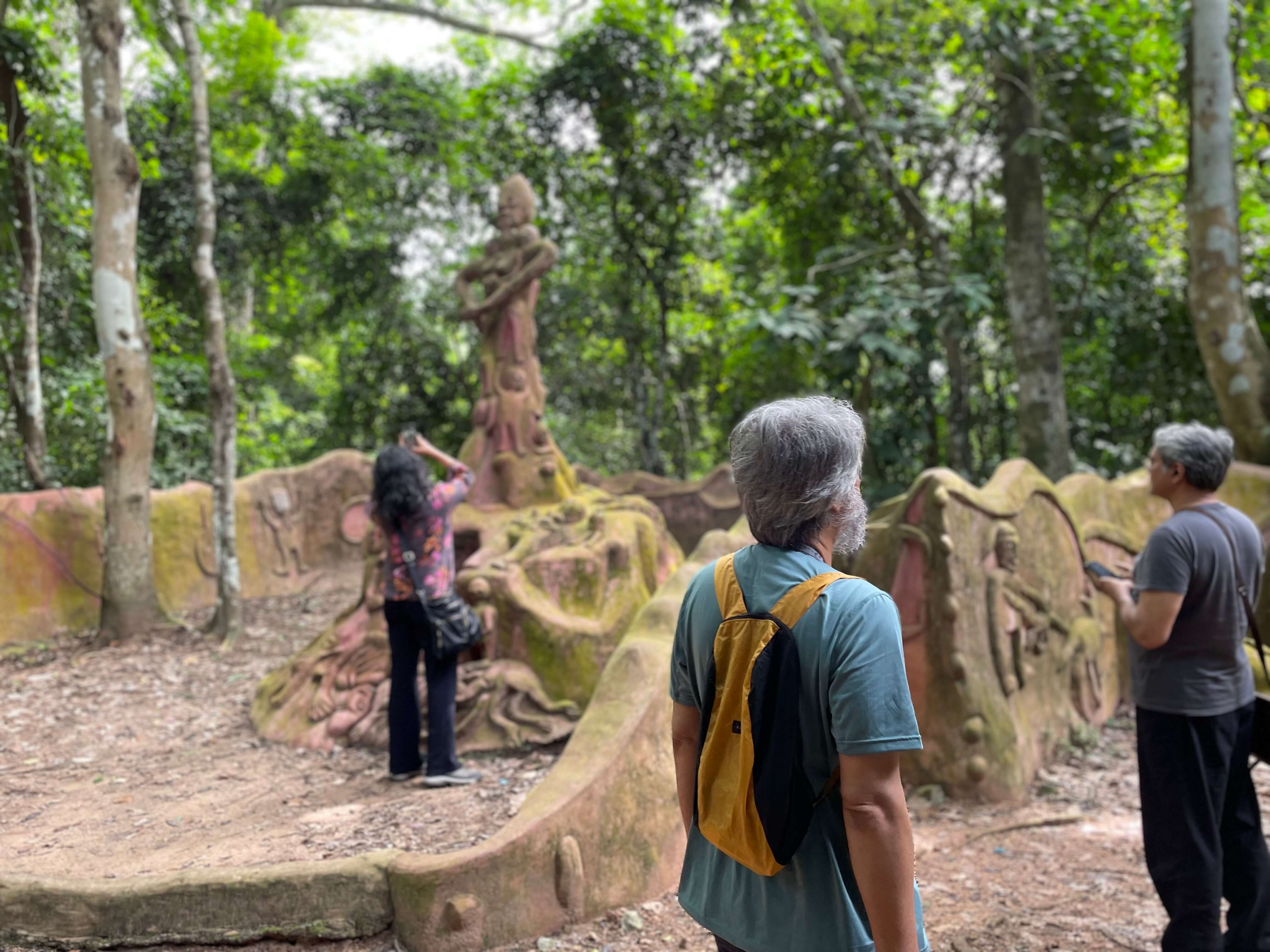On the evening of 5th June Raqs Media Collective, (comprised of Monica Narula, Jeebesh Bagchi, and Shuddhabrata Sengupta) landed at Lagos’ bustling Murtala Muhammed International Airport. The region is currently entering the peak of the rainy season, a period of annual rainfall that gradually increases in intensity as moist Atlantic air cloaks the expansive country.
For New Delhi-based Raqs, the heavy showers provided a comforting reminder of home, “I love waking up to the rain here, the monsoon season is my favourite time of year in India” commented Narula. The observation felt like a serendipitous introduction to the work the collective will be undertaking in Nigeria.

Raqs Media Collective at Tafawa Balewa Square, Lagos
As part of their contribution to the World Weather Network, Raqs are investigating water in the context of the 28th parallel north – the circle of latitude 28 degrees north of the equator that takes in Africa, Asia, the Atlantic Ocean, the Pacific Ocean, and North America. Their research began in the northern Indian city of Rajasthan through fellow WWN station Khoj. Here, ancient manmade structures called stepwells provided a framework for relating climate change to sacred geometry and water as a lived memory.

Raqs Media Collective at the Osun-Osogbo sacred groves.
The time has now come for that research journey to continue in Nigeria and more specifically at the Ecology Green Farm which sits on the outskirts of the village Ikise located approximately two hours outside of Lagos. Here Raqs will be based at the Guest Artists Space (G.A.S.) Foundation Farm House, a building designed by Nigerian architect Papa Omotayo and made principally out of 40,000 rammed earth bricks that began life as the excavated foundational soil of the structure. Thanks to the heavy rains the farm is particularly lush at this time of year. It has been producing harvests of various vegetables and tubers such as bell peppers, cassava and cashew for some time, but in recent months has welcomed lush orchards of lemon and coconut trees.

Eégún (masquerade) and arugbá (maiden with pot) at a small neighbourhood preliminary celebration in the lead-up to the Osun-Osogbo festival.
The Ecology Green Farm is conveniently located within driving distance of several sites of significance that Raqs aim to visit and document during their trip. Amongst them are Sungbo’s Eredo, a system of defensive walls built in 800-1000 AD, and the Osun-Osogbo Sacred Groves, a dense forest regarded as the abode of the Yoruba river deity Osun that is dotted with sanctuaries and sculptures in her honour. The project has a highly collaborative inclination, therefore, site visits like these will be punctuated with meetings with local architects, scholars ecologists, researchers and artists. Raqs comment: “By venturing beyond our familiar terrain of New Delhi, we seek to unearth the resonances and shared experiences that bind these diverse regions and offer fertile ground for reflection, dialogue, and the cultivation of new artistic expressions. This cross-cultural exploration can uncover common threads that connect our communities and transcend geographical borders.”
About Raqs Media Collective
Raqs Media Collective (started in 1992, by Monica Narula, Jeebesh Bagchi, and Shuddhabrata Sengupta). The word “Raqs” in several languages denotes an intensification of awareness and presence attained by whirling, turning, and being in a state of revolution. Raqs take this sense to mean ‘kinetic contemplation’ and a restless and energetic entanglement with the world and with time. Raqs practices across several media; making installation, sculpture, video, performance, text, lexica, and curation. Their work finds them at the intersection of contemporary art, philosophical speculation, and historical inquiry.
Raqs has exhibited widely, including at Documenta, Venice, Istanbul, Taipei, Liverpool, Shanghai, Sydney, and Sao Paulo Biennales. Some solo exhibitions (and projects) include “Pamphilos” at Fast Forward Festival 6, Athens (2019); “Still More World” at Mathaf Museum of Modern Art, Doha (2019); “Twilight Language” at Manchester Art Gallery (2017-2018); “Everything Else is Ordinary” at K21 Museum for 21st Century Art, Dusseldorf (2018); “If It’s Possible, It’s Possible”, MUAC, Mexico City (2015) and “Untimely Calendar” at the National Gallery of Modern Art, Delhi (2014-2015). Exhibitions curated by Raqs include “In The Open or in Stealth” (MACBA, Barcelona 2018 – 2019); “Why Not Ask Again” (Shanghai Biennale 2016-2017); “INSERT2014” (New Delhi, 2014), and “The Rest of Now” & “Scenarios” (Manifesta 7, Bolzano, 2008). They were the Artistic Directors of the Yokohama Triennale 2020, “Afterglow”, and most recently they exhibited “The Laughter of Tears” at the Kunstverein Braunschweig (2021), and “Hungry for Time”, which was an invitation to epistemic disobedience with the collections of the Academy of Fine Arts in Vienna (2021), “Waves are rising” at the Royal Docks (2023), and “1980 in Parallax” at the Cosmic House, London (2023, ongoing).